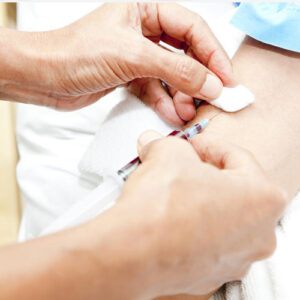The male reproductive system consists of the penis, testicle, scrotum, and other accessory organs that produce, maintain, and transport semen and sperms. Sperms are the male reproductive cells whereas semen is the protective fluid. Hence, the male reproductive system also produces and secretes male sex hormones responsible for sexual characteristics.
Cancer is a condition in which cells of an organ divide abnormally and uncontrollably and compete with normal cells for nutrition and growth. So, here is a list of types of genital cancers found in males.
Penile Cancer
So, the cancer of the penis is known as penile cancer caused by the growth of normal cells into cancerous cells leading to tumor formation. Men over 60 years of age, with excessive smoking habits, and poor personal hygiene are more likely to develop penile cancer. However, penile cancer can also be caused by sexually transmitted infections. Therefore, if penile cancer is severe, it may affect nearby areas such as the prostate gland, scrotum, and pubic bone.
Symptoms Of Penile Cancer
- Development of lump or ulcer on the penis
- Change in the color of the penis
- Thickening of penile skin
- Swelling of lymph nodes of the groin
- Itching, burning, and redness in the pelvic area
- Liquid discharge under the foreskin
- Appearance of rashes
Prostate Cancer
A small gland located in the lower abdomen in males is known as the prostate gland which is regulated by the testosterone hormone. The prostate gland plays a major role in the production of seminal fluid. Cancer of the prostate gland occurs due to the malignant growth of cells forming a tumor in the prostate. Prostate cancer can be divided into two types- Aggressive and Non-aggressive based on its rapid growth. Therefore, the risk factors for developing Prostate cancer include old age, obesity, genetic changes, ethnicity, race, and family history of cancers.
Symptoms Of Prostate Cancer
- Urinary problems- frequent urges to urinate, slower stream while urinating, and blood discharge in urine
- Pain and numbness in pelvic area, chest, and neck
- Erectile dysfunction
- Swelling and puffiness in legs
- Change in bowel habits
- Abnormal weight loss with no apparent cause
Testicular Cancer
Testes are the male reproductive organ located inside the scrotum responsible for the production of sperms and testosterone. Testicular cancer develops due to the formation of a tumor in either one or both testicles or testes. Seminomas and nonseminomas are the two types of germ cell tumors divided on the basis of how rapidly they grow and expand. Therefore, the risk factors of testicular cancer include undescended testicles, family history of cancer, and abnormal testicular development.
Symptoms Of Testicular Cancer
- Testicular swelling and redness
- Pain and discomfort in testicles
- Pain in abdomen, groin, scrotum, and back
- Changes in male breast tissues
- Growth of painless lump in the testicle
Urethral Cancer
A hollow tube that serves as a common passage for urine and sperms in males is the urethra. Urological cancer of the urethra is rare and difficult to detect at an early stage. Generally, individuals suffering from chronic inflammation or infections are at a greater risk of developing urethral cancer. Males diagnosed with sexually transmitted infections (such as HPV) are more likely to develop urethral cancer. Hence, old people, people with bladder cancer, and urethral stricture often develop urethral cancer.
Symptoms Of Urethral Cancer
- The appearance of a lump on or near the urethra
- Reduced urinary flow or dribbling
- Bleeding and pain while urinating
- Urinary incontinence
- The appearance of enlarged lymph nodes in the groin
- Frequent urges to urinate
Bladder Cancer
The urinary bladder holds urine produced in the body and guides the urge to remove it with the help of stretch receptors. Generally, males with exposure to chemicals and chronic bladder infections are more likely to develop bladder cancer.
It can be of the following types.
- Squamous cell carcinoma, occurs in the squamous cells of the urinary bladder. Hence, leading to irritation, redness, and pain.
- Transitional cells are modified cells of the urinary bladder that stretch and change shape to store and pass urine. Carcinoma occurs in the transitional cells of the urinary bladder.
- Adenocarcinoma occurs in the glandular cells of the bladder. Hence, it causes inflammation and irritation.
Symptoms Of Bladder Cancer
- Bleeding and pain while urinating
- Urinary incontinence
- Frequent urges to urinate
- Pain in abdomen and lower back
- Unexplained tiredness
- Weight loss with no apparent cause
- Bone tenderness
Conclusion
However, to summarize, cancer develops when cells of any organ divide abnormally and uncontrollably forming a tumor. Bladder cancer, penile cancer, urethral cancer, prostate cancer, and testicular cancer are some of the male-centric cancers. Furthermore, the treatment of cancer is majorly by the location of the tumor, size of the tumor, stage of cancer, and age of the patient. Therefore, general symptoms associated with cancer of any genital part include pain, redness, and discomfort in that area. Also, growth of lumps that may be painful or painless, urinary incontinence, and changes in the genital color or structure.




